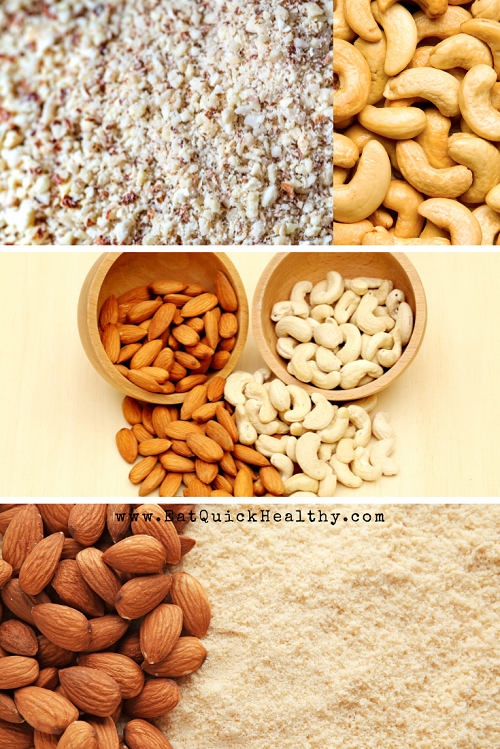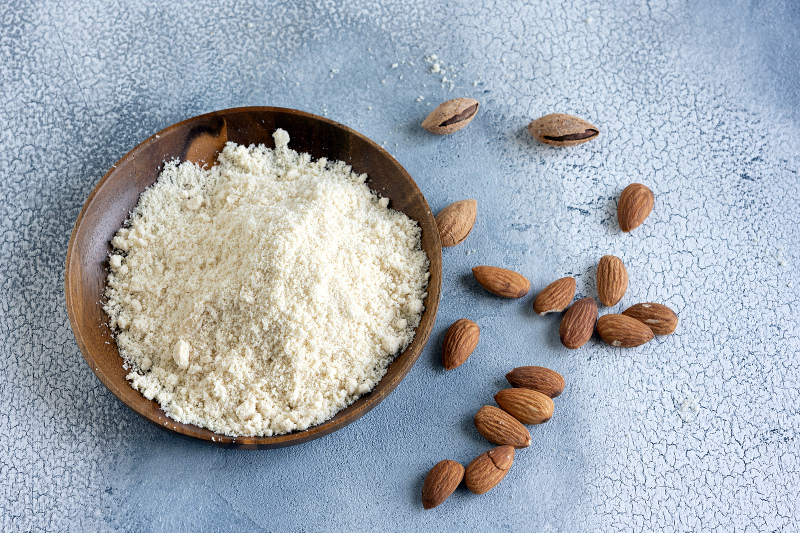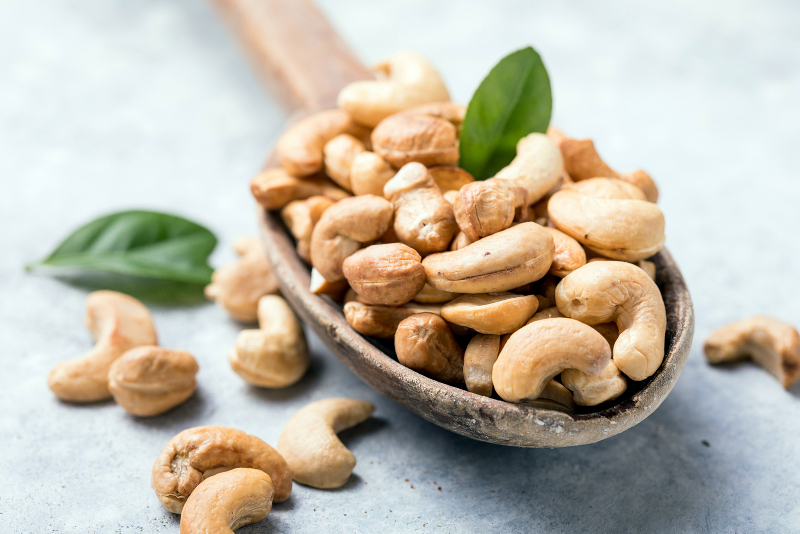Looking for alternate flours that are gluten free, perfect for a paleo diet and even easy to make yourself? Consider cashew and almond flour!
Both flours can be used in many places you would use regular flour, and you can also substitute almond flour for cashew in many places.
If you landed on this article, you may be wondering what the differences are between almond and cashew flour. In this full guide, I share exactly what each flour is, how you can make it and what the differences and similarities are including a full cashew flour vs almond flour showdown.
I also discuss whether you can substitute almond flour for cashew flour and vice versa and how to go about this.
Let’s start!

What Is Almond Flour

Almond flour is made from ground almonds after the almonds have been blanched and skinned. This is the process of placing almonds in boiling water and soaking them so the skins are removed.
At this point, they are dried and ground which results in a flour which is a very pale brown/off-white color. Bought almond flour is usually a fine ground. It’s gluten free and has a mild flavor which tastes like roasted almonds when baked.
Almond flour is a great alternative to all-purpose flour in denser cakes, bread and cookies. It has more nutrients than regular flour and is protein rich so it’s a useful ingredient when you want to add more protein to food. It’s also used by people following a paleo diet.
It’s also higher in fat so can help add a moist texture to items like muffins and brownies.
What’s The Difference Between Almond Flour And Almond Meal?
Almond flour is different to almond meal, but they are very similar. Almond meal is made by grounding whole almonds – so not removing the skins first. This results in a darker colored flour which is coarser and tastes a little bitter.
What Is Cashew Flour?

Cashew flour is a gluten free, grain free powder which is easy to make. It is made from ground cashews.
While often referred to as a nut flour, cashews are actually a seed – they come from the seeds of a cashew apple. So you can use cashew flour in a paleo diet.
Since cashews don’t have skin, there is no need to remove them first or do anything else but ground the cashews which can be done by using a food processor or a high-speed blender.
Cashew flour can be used in places you are currently using nut flours like almond flour. It can work in cookies, pie crusts or as an alternative to bread crumbs. It can add a slightly sweet and nearly creamy flavor to dishes as well as a rich smell.
What’s The Difference Between Cashew Flour And Cashew Meal?
Cashew meal and cashew flour are the same thing, although sometimes it can refer to how finely ground the cashews are with cashew flour being finer than the meal which is likely to be coarser.
Read more about cashew meal here.
Cashew Flour Vs Almond Flour
Almond flour and cashew flour are very similar which is why they can make good substitutes for each other. They both don’t contain cholesterol or gluten and are high in antioxidants.
However, there are some differences too.
What Are The Differences?
Since cashew flour and almond flour are made from different ingredients, this leads to differences in their flours.
Taste
There isn’t a huge difference between the tastes these flours will add to cooking but almond has a more nutty taste whereas as cashew flour leads to a more sweet and creamy taste. These tastes are subtle, however.
Density
Almond flour is denser than cashew flour. In fact a cup of almond flour weighs about 28% more than a cup of cashew flour.
Calories
Almond flour also has more calories than cashew flour – about 35% more.
Fat
Almond flour has a higher fat content than cashew flour. In flours I looked at, almond flour had 56g of fat in a cup compared to 38g in cashew flour.
Fiber
Almond flour also has a lot more fiber than cashew flour. 56% of your daily recommended intake can be found in a cup of almond flour whereas for cashew flour, it’s only 12%
Nutrients
In general, almond flour has more nutrients than cashew flour, including a lot more calcium, although cashew flour wins in iron content.
Which Is Best?
Whether almond flour or cashew flour is the winner is really personal preference. They are similar enough that I am usually happy to use whatever is on hand.
If you have a specific need, like want more fiber in your diet or are trying to limit calories, then you can pick the flour which best suits this need. Otherwise, it doesn’t really matter unless you have a taste preference.
Can I Substitute Cashew Flour For Almond Flour?
Yes, you can definitely substitute almond flour for cashew flour. In fact, this may be the best substitution if you need an alternative to almond flour. For people allergic to almonds (but not cashews), this is the best way to go.
It’s a 1:1 substitution and it shouldn’t alter the texture or taste of your end product much.
It also works in the other direction as in you can substitute cashew flour for almond flour.
Conclusion
I hope you have found this guide to almond flour vs cashew flour useful and now know exactly when you want to use cashew flour or almond flour in your cooking.
Which to use is really up to you and is about personal preference and what you have on hand.
You can also read my guide to almond flour vs rice flour here, almond flour vs walnut flour here or click here to read more guides to almond products. Find out how long almond flour lasts here.



Comments are closed.